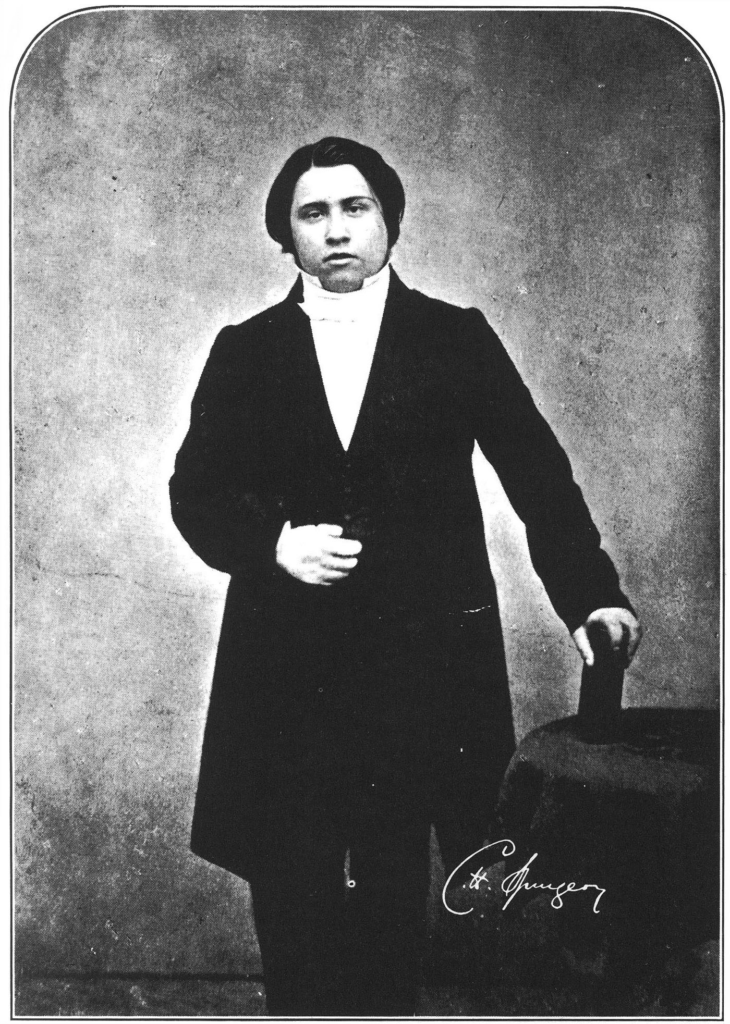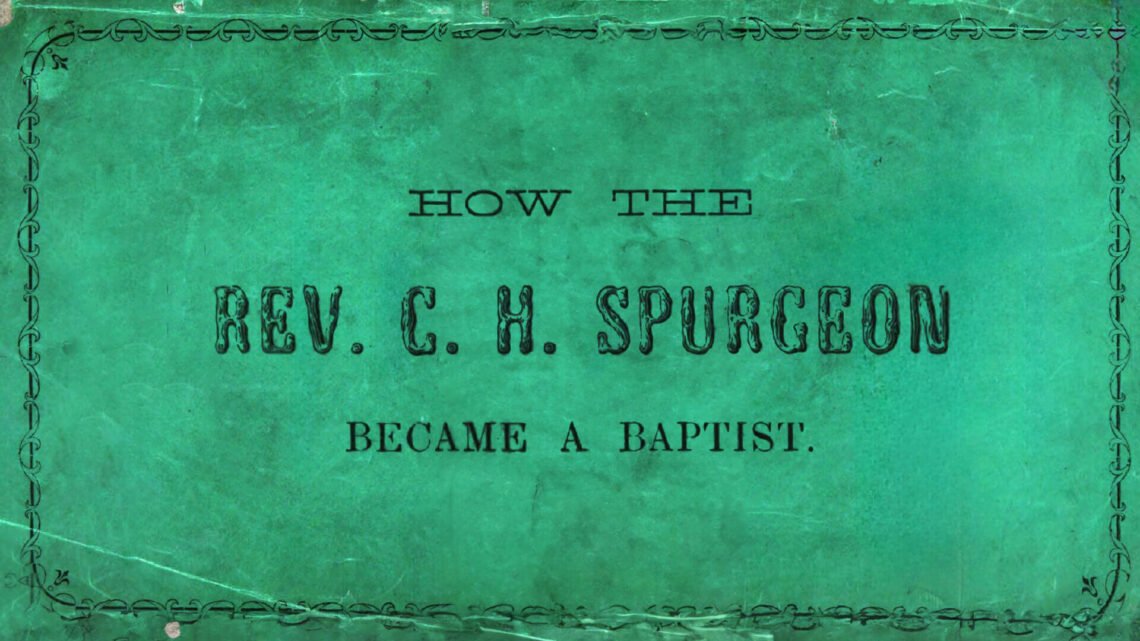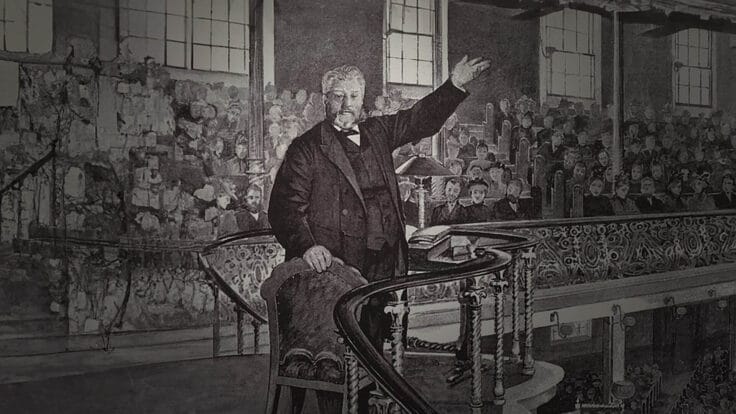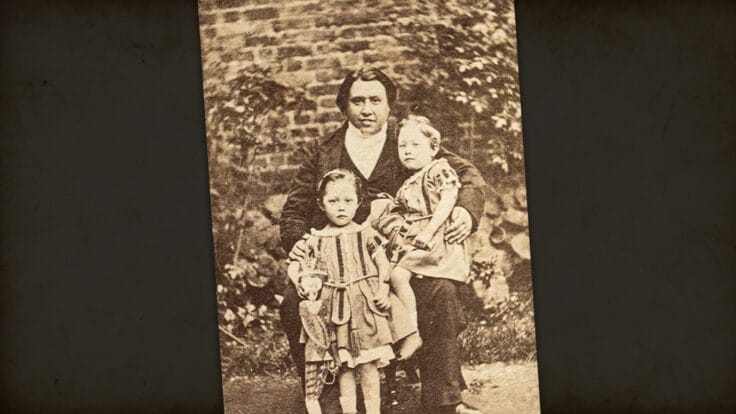Even though his father and grandfather were Congregationalists, Charles Haddon Spurgeon became a committed Baptist the year of his conversion and remained so until his death.
But how is it that young Charles came to such a position so early on in his life? Thankfully, we do not need to speculate. Spurgeon provided an article to The Baptist Reporter in 1853 titled “How the Rev. CH Spurgeon became a Baptist — As Related by Himself.”
And so we have the opportunity to hear from CH Spurgeon himself as to why he became a Baptist. You will find the text of this article below, and a PDF scan of an 1857 publication can be accessed here.

About the close of the year 1853, the Editor of the Baptist Reporter received from the REV. C. H. SPURGEON the following communication, which is here given just as it appeared in the December issue of that publication:
CONFESSIONS OF A CONVERT.
To the Editor of the Baptist Reporter.
DEAR SIR, — I am a baptist, not by education, but by conviction. Coming out from an ancient Independent family, I am a convert from sprinkling with water to baptism in water; and with your permission I will, like a certain anonymous writer, publish my “confessions.”
I will not say a word of what I heard of baptists in my childhood, for I do not think my parents meant me to believe that baptists were bad people; but I certainly did think so, and I cannot help thinking that somewhere or other I must have heard some calumnies against them, or else how should I have had the opinion?
I remember seeing a baby sprinkled within less than an hour of its death; and I seem to hear even now the comforts which certain parties gave to the bereaved parent—”What a mercy it was baptized! What a consolation it must be!” This was in an Independent family, and the words were spoken by an Independent minister.
I knew an instance of an aged minister, of the same persuasion, who baptized a little boy although the father was averse to it. The child was running about in the hall of the minister’s house, and the mother looking on. He was caught up, and the pious man exclaimed, “Come along Mrs. S., the poor child shall not live like a heathen any longer.” So the conjuration was performed, and the little boy was put into the pædobaptist covenant. He was not only suffered to come, but forced to come; and doubtless went on his way rejoicing to think it was over.

I was, at fourteen, sent to a Church of England school, where we had three clergymen who by turns came to teach us their religion. But, somehow or other, the young gents did not seem to get on much, for when one of them was asked by the clergyman how many sacraments there were, he said, “seven,” and when that was denied, he said, “Oh, Sir, there is one that they take at the haltar.” Upon which I could not help saying, “that’s hanging I should think;” which suggestion made even the reverend gentleman smile, although, of course, I was bidden not to be so rude as to interrupt again. I am sure that many of the sons of the gentry in this large establishment were more ignorant of Scripture than the boys in some of our Ragged Schools.
One of the clergy was, I believe, a good man; and it is to him I owe that ray of light which sufficed to show me believers’ baptism. I was usually at the head of the class, and when the catechism was to be repeated, something like the following conversation took place.
C. What is your name?
S. S- Sir.
C. No, no, what is your name?
S. Charles S- Sir.
C. Now you should not behave so, for you know I only want your Christian name.
S. If you please, Sir, I am afraid I haven’t got one.
C. Why how is that?
S. Because I do not think I am a Christian.
C. What are you then? A heathen?
S. No, Sir; but we may not be heathens, and yet be without the grace of God, and so not be truly Christians.
C. Well, well, never mind; what is your first name?
S. Charles.
C. Who gave you that name?
S. I am sure I don’t know, Sir; I know no godfathers ever did anything for me, for I never had any. Likely enough my mother and father did.
C. Now you should not set these boys a laughing. Of course I do not wish you to say the usual answer.
He seemed always to have a respect for me, and gave me the “Christian Year,” in calf, as a reward for my great proficiency in religious knowledge.
Proceeding with the catechism, he suddenly turned to me and said:
S- -, you were never properly baptized.
S. Oh yes, Sir, I was; my grandfather baptized me in the little parlour, and he is a minister, so I know he did it right.
C. Ah, but you had neither faith nor repentance, and therefore ought not to have received baptism.
S. Why, Sir, that has nothing to do with it. All infants ought to be baptized.
C. How do you know that; Does not the Prayer Book say faith and repentance are necessary before baptism? And this is so scriptural a doctrine that no one ought to deny it. (Here he went on to show that all the persons spoken of in the Bible as being baptized were believers; which, of course, was an easy task.) Now, I shall give you till next week to find out whether the Bible does not declare faith and repentance to be necessary qualifications before baptism.
I felt sure enough of victory; for I thought that a ceremony my grandfather and father both practised in their ministry must be right—but I could not find it—I was beaten—and made up my mind as to the course I would take.
C. Well, Charles, what do you think now?
S. Why, Sir, I think you are right; but then it applies to you as well as to me.
C. I wanted to show you this; for this is the reason why we appoint sponsors. It is true that without faith I had no more right than you to holy baptism; but the promise of my sponsors was accepted by the church as an equivalent. You have no doubt seen your father, when he has no money, give a note of hand for it: and this is regarded as payment, because, as an honest man, we have every reason to expect he will pay it. Now sponsors are generally good people, and in charity we accept their promise on behalf of the child. As the child cannot at the time have faith, we accept the bond that he will; which promise he fulfills at confirmation, when he takes the bond into his own hands.
S. Well, Sir, I think it is a very bad note of hand.
C. I have no time to argue that, but I believe it to be good. I will only ask you this—Which seems to have the most regard to Scripture; I, as a churchman, or your grandfather, as a dissenter? He baptizes in the very teeth of Scripture; and I do not, in my opinion, do so, for I require a promise, which I look upon as the equivalent of repentance and faith, to be rendered in future years.
S. Really, Sir, I think you are most likely right; but since it seems to be the truth that only believers should be baptized, I think you are both wrong, though you seem to treat the Bible with the most politeness.
C. Well, then, you confess that you were not properly baptized; and you would think it your duty, if in your power, to join with us and have sponsors to promise on your behalf?
S. Oh no! I have been baptized once before I ought; I will wait next time till I am fit for it.
C. (Smiling.) Ah, you are wrong; but I like to see you keep to the Word of God; seek from Him a new heart and divine direction, and you will see one truth after another, and very probably there will be a great change in those opinions which now seem so deeply rooted in you.
I resolved from that moment that if ever Divine grace should work a change in me I would be baptized, since, as I afterwards told my friend the clergyman, “I never ought to be blamed for improper baptism, since I had nothing to do with it; the error, if any, rested with my parents.”
I have, I hope, felt the power of Jesus’ love; and by the means of a good baptist minister I was set right as to the mode, and was baptized in the river at Isleham.
I am only nineteen, and have been for two years minister of a Baptist church, whose baptisms you have had of late to report.
I have a brother younger still, who has come out and has passed through the same ordinance.
We were charged with making too much of baptism, and were told that we ought to wait and sit down at the Lord’s table in hopes that our views might yet change. But we do not make too much of baptism; I count it as but dross if men trust in it—mere stubble to be consumed. Christ is all! Nothing bring I in my hands.
Away with “putting into the covenant,” “regenerating,” “christening,” and all this popish merit-mongering! Let us have baptism in its place within the church; but not as a merely useful ordinance for all, or indeed, as to merit, for any. As to which has the best of the point, the man in the gown, or the sprinkler in plain black, I think I might illustrate their relative position by a fable.
“A certain king had a window in his palace, which being broken caused him much inconvenience. Having in his service two glaziers, he commanded them to repair the said window; the one flatly refused to obey his majesty, and the other hung a cobweb over it. Whereupon the monarch confined one for six months, and the other for half a dozen.”
I rejoice to have got clear of both, whilst yet I love and give the hand of fellowship to all who believe the doctrine; “By grace are ye saved through faith; and that not of yourselves: it is the gift of God.”
W- C. S.

N.B.—I am ready to give names for all the parties should any of my old friends see this; but it will be better for themselves if they will let me alone, as any tap on the vessel will only let more run out. The conversations are, as near as I can recollect, after five years have elapsed, as near correct as possible, and I have not, knowingly, altered a word.
[We have the name and residence of our Correspondent.] — ED. B. R.
Mr. Spurgeon began to preach at New Park-street chapel, in the Borough, in November, 1853; and since March, 1854, up to this time (July, 1857) has baptized about six hundred believers.
May the grace of God preserve him!





